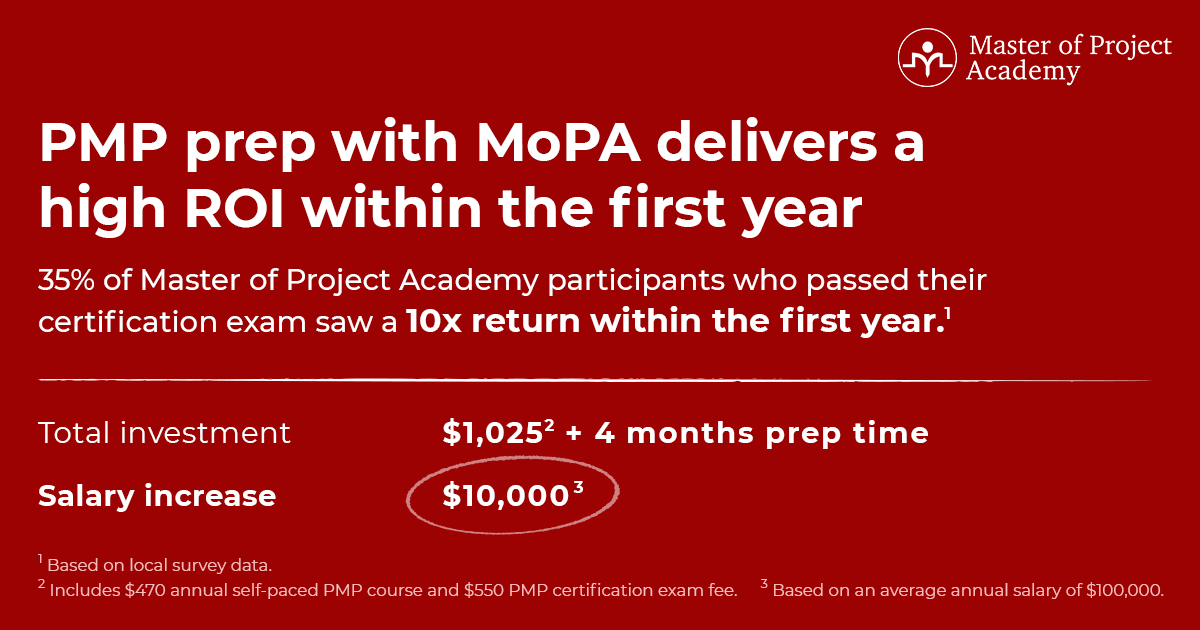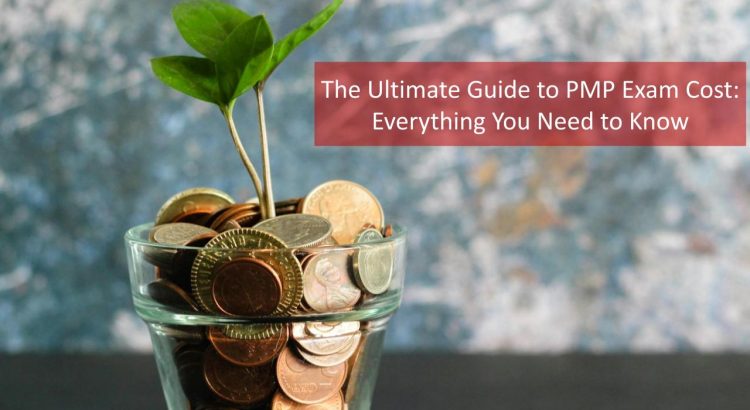Earning the Project Management Professional (PMP)® certification is a career-transforming move. But one of the first questions aspiring candidates ask is: “How much does the PMP Exam really cost?”
The answer isn’t just about the price tag of the exam. Preparing for PMP involves several costs—membership, study materials, training, retakes, and time. In this comprehensive guide, we’ll break it down with clarity, include offerings from Master of Project Academy, compare with PRINCE2, and show real salary data to help you see the return on investment.
PMP Exam Cost Breakdown
Here’s a detailed look at the primary costs associated with registering and sitting for the PMP exam:
- PMP Exam Fee (PMI Members vs. Non-Members)
- PMI Members: USD $425
- Non-Members: USD $675
- 💡 Becoming a PMI member before registering is often worth it. Membership costs USD $164/year, but you save $250 on the exam and gain access to valuable resources like the PMBOK® Guide and practice standards.
- PMI Membership Fee
- Individual membership: USD $164/year (plus any one-time application fee as per PMI rules).
- Many candidates join PMI both for the exam discount and for access to member resources, standards, networking, and career support.
- PMP Exam Retake Fee
- PMI Members: approx $275
- Non-Members: approx $375
- You have up to three attempts within your one-year eligibility period if needed.
- PMP Renewal Cost
- Every three years: $60 (members) or $150 (non-members).
- Training & Prep Courses
- Range from about USD 200 – USD 2,000, depending on format (self-paced, instructor-led, bootcamps).
- Must include 35 contact hours of project management education.
- Study Materials
- Books (including PMBOK® Guide): roughly USD 40 – USD 100
- Practice exams / simulators: USD 50 – USD 200, possibly more depending on number of mocks, etc.
Check out Master of Project Academy’s PMP Exam Simulator.
FAQs About PMP Exam Cost
1. Is the PMP exam fee refundable?
No. Once your application has been approved and you’ve paid, exam fees are typically non-refundable. However, PMI allows rescheduling under certain policies.
Creating a Winning PMP Application: Meeting PMI’s Guidelines
2. Should I join PMI before applying for the PMP?
Yes—if you value the discount and the resources. The cost of membership is more than offset by the lower exam fee and benefits like free or discounted publications, standards, templates, etc.
3. What if I fail the PMP exam?
You can retake up to two more times (three total) in the one-year eligibility window. Each retake has its own fee (~USD $275 for members, ~USD $375 for non-members).
4. Does the cost differ by country?
The fees above are USD-based global fees set by PMI. Local taxes, currency conversion, training costs, and exam delivery mode (online vs. test center) may affect what you pay in your country.
5. Are there hidden or indirect costs?
Yes. Everything from lost work time, study time, travel (if going to a test center), needed hardware/internet for online or proctored exams, additional coaching or mentoring, etc., can add up.
6. Can employers cover the PMP exam cost?
Often yes. Many organizations support professional development budgets, reimburse certification costs, or offer training allowances. Always check with your HR or manager.
How to Turn $5,250 of Tax‑Free Educational Assistance into a High‑Performance Project Team?
Why Master of Project Academy’s PMP Options Are Worth Considering
When budgeting for your PMP journey, how you prepare directly affects both cost and success. Below are four high-value offerings from Master of Project Academy (MoPA) that can shape your preparation and improve your return on investment.
| Training Option | What It Includes | Who It’s Best For | Key Advantages |
| PMP Exam Complete Training – 35-Hour Ultimate PMP (Self-Paced) | • 35 PMI contact hours via self-paced online training
• 750+ practice questions • Full mock exam • 20 real-world situational case studies, cheat sheets, support tools • 30-day money-back guarantee |
Ideal for those needing flexibility: working full time, irregular hours, or prefer to study at own pace. Perfect if you want to revisit content multiple times. | Very strong pass rates among past students; controlled cost; schedule control; reusability of materials. |
| PMP Live Class / Virtual Instructor-Led Training | 4-day interactive virtual course, covering the same content, with live instructor Q&A; often bundled with self-paced materials in premium plans. | Best for learners who prefer real-time interaction, accountability, peer discussions and feedback. | Faster-paced learning, immediate clarification of doubts, structured schedule helps maintain momentum. |
| PMP Certification Bundles (“PMP Bundle”) | Self-paced core PMP training (35 hours) + extras: exam simulators, situational case studies, cheat sheets, plus tools/software training depending on the bundle. | Great for those who want not only to pass the exam but also gain adjacent skills (tools, analytics, templates) that increase job readiness. | More content per dollar; more practice exam exposure; extra skills increase employability; often a strong ROI. |
| Project Management Training Bundle – 9-Course Full PM Bundle | A larger bundle (9 courses) including project management, agile/scrum, Microsoft Project or similar tools, financial forecasting, Power BI, etc.; many hours of learning and practice material. | Best for those aiming for a broad skill set, leadership roles, or wanting to build out project management know-how beyond just exam prep. | Exceptional long-term value; skills spillover to your job; more variety keeps you motivated; helps with continuous professional development. |
Cost-Comparison: PRINCE2 vs. PMP
To help appreciate the value of PMP more fully, here’s a comparison of PMP with PRINCE2 (Projects IN Controlled Environments). This shows how much each costs, what credentials each offers, and how that maps to career opportunity.
| Certification | Key Levels / Versions | Typical Exam & Training Costs* | Renewal / Maintenance Requirements | Geographic / Industry Reach |
| PRINCE2 | Foundation; Practitioner (latest version) | – Foundation exam only: approx USD 388
– Practitioner exam: approx USD 451 – Training (including exam) typically adds USD 700-1,200 or more depending on provider & location for each level. |
Practitioner level is valid for a period (often 3-5 years) or requires re-registration/renewal; Foundation has no renewal requirement in many cases. | Strong recognition in UK, Europe, Australia; widely used in government, public sector, regulated industries; growing global adoption. |
| PMP | Single credential with prerequisites (education + experience + 35 contact hours) | – Member exam fee: USD $425
– Non-member exam fee: USD $675 – Training & prep (bundles or live/self-paced): USD ~200-2,000 or more depending on format – PMI membership: USD $164/year |
Renewal every 3 years; requires earning Professional Development Units (PDUs); maintenance of credential. | Very broad global recognition across many industries (IT, finance, construction, consulting, services); high demand in the US, Middle East, Asia, etc. |
*Costs are estimates in USD; actual cost depends on provider, location, currency, etc.
Real-World Salary Comparison: PMP vs. PRINCE2
To assess the return on your investment, here’s what the data is showing for salary differences between professionals with PMP certification vs. those with PRINCE2:
| Metric | PMP-Certified Professionals | PRINCE2-Certified Professionals |
| US Average / Typical Salary | PMP holders in the U.S. often report average base salaries between USD $120,000 – $135,000depending on experience, industry, and location. | PRINCE2 holders in the U.S. tend to earn less on average, often around USD $77,000 – $90,000depending on level, experience, and the role. |
| Salary Premium Over Non-Certified Peers | Data suggests PMP certification often brings a 10-20% or more uplift over non-certified project managers. In some industries (IT, engineering, finance), the premium may be even higher. | PRINCE2 also boosts salary over non-certified individuals, but in many markets the premium is more modest compared to PMP. Variables like public sector vs private, geographic region, and specific employer matter heavily. |
| Experience-Based Differences | For less experienced PMP holders (under 3-5 years), salaries may start lower (USD ≈ $75,000-$105,000) and climb significantly with seniority. For those with 10-20 years or in leadership roles, figures of USD $125,000 to USD $140,000+ are common. | For PRINCE2, salaries tend to increase with experience too, but average top roles often remain below what equivalent PMP holders are commanding in many regions — especially when PMP’s demand and reputation are stronger. Specific numbers vary sharply by country. |
How to Negotiate a 10% Salary Raise Once You Have Passed the PMP Exam?
Why PMP Offers Higher Value
From comparing PMP vs. PRINCE2 and examining salary data, here are some compelling reasons PMP tends to deliver better long-term return:
- Higher salary potential globally. PMP holders often command higher base pay, especially in regions where PMP is better recognised (U.S., Middle East, Asia).
- Stronger premium over non-certified peers. The experience, education, and training required tend to correlate with more responsibility and trust, hence more pay.
- Demand & versatility. PMP covers more domains and knowledge areas, which are valued across industries. PRINCE2 is excellent in certain regions/sectors, but PMP is more ubiquitous.
- Renewal and continuing-education reinforce relevance. PMP requires ongoing PDUs; that encourages certified professionals to stay current with emerging best practices, which keeps their value high.
- Preparation quality and pass-first attempt. Good prep (bundles, practice exams) tends to reduce risk of needing retakes; passing first time saves both cost and time.
Unlock Your Career Potential: A Comprehensive Guide for PMP-Certified Professionals
PMP Exam Cost: A Quick Snapshot
| Expense | Member | Non-Member |
| PMP Exam Fee | $425 | $675 |
| PMP Retake Fee | ~$275 | ~$375 |
| Renewal Fee (every 3 years) | $60 | $150 |
| PMI Membership | $164/year | – |
Hidden Costs You Might Overlook
Beyond the obvious exam registration, consider:
- Time away from work or regular duties for study.
- Technology/hardware/internet costs (especially for online or proctored exams).
- Travel, if opting for in-person options.
- Additional coaching, mentoring, or exam simulators, especially if you want a high confidence level going in.
Check out Master of Project Academy’s Online PMP® One-on-One coaching session
How to Minimize Your PMP Exam Costs
- Join PMI before registering. The discount almost always justifies the membership cost.
- Choose the mode of training that aligns with your learning style and schedule (self-paced vs live) to avoid unnecessary waste.
- Select a bundle with many practice exams to reduce chances of retake.
- Leverage employer or organizational support. Many companies reimburse training or exam fees.
- Plan ahead; time investment spread out can reduce stress, boost retention, reduce waste.
Final Thoughts
While the PMP exam cost (and preparation) may seem substantial, thinking of it as an investment rather than just an expense brings more clarity. With strong preparation, the right training option (like those offered by Master of Project Academy), and leveraging the advantages of PMI membership, the PMP can offer excellent return: higher credibility, better roles, greater global mobility, and higher salary prospects.
For many professionals, especially those wanting maximum flexibility, broad global recognition, and deep foundational knowledge across industries, the PMP represents a higher-value investment compared to certifications like PRINCE2.

